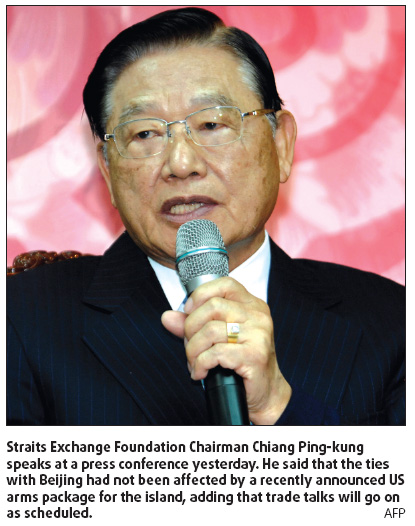Challenges, opportunities for ECFA: SEF
Updated: 2010-02-09 07:30
(HK Edition)
|
|||||||||

Chairman: Trade pact will be core of cross-Straits exchanges
TAIPEI: The upcoming Year of the Tiger will present both challenges and opportunities for negotiations on a proposed cross-Straits trade pact that Taiwan hopes to ink with the consensus of the public, Taiwan's top mainland affairs negotiators said yesterday.
Speaking at a year-end press conference, Straits Exchange Foundation (SEF) Chairman Chiang Ping-kung said the priority for the coming year will be signing the Economic Cooperation Framework Agreement (ECFA) with the mainland on the basis of a consensus among the Taiwanese public.
In terms of cross-Straits relations, the coming year will be more challenging than previous years because of ECFA, while at the same time presenting more opportunities than ever before, he said.
"The ECFA will be the core of cross-Straits exchanges in the new year," he went on to say.
While both sides concluded their first round of talks in late January and a substantial part of the agreement has yet to be discussed at all, Taiwan still intends to sign the agreement as soon as possible, preferably before the Legislative Yuan's June recess, so that the agreement can take effect in 2011, Chiang said.
As the ECFA support rate plummeted from 70 percent in April last year to 50.9 percent in an Executive Yuan survey in early January, the administrative branch knows it must do a better job of convincing the general public, as well as the opposition Democratic Progressive Party (DPP), as to why the deal is important for Taiwan's economy, he added.
Bidding farewell to the Year of the Ox, the government has vowed to be transparent during the negotiations process, to notify the legislative branch about progress of the negotiations and to put the agreement under legislative review. It has also promised to improve its communication with the public on the ECFA, which many fear would cause an influx of mainland products and job losses.
The Mainland Affairs Council (MAC), Taiwan's top mainland policy-making authority, said the ECFA negotiation team is scheduled to brief the Legislative Yuan ten times from February to June.
The MAC also plans to step up its communication on ECFA with three groups - residents in central and southern Taiwan, those from low- and middle-income households and owners of small- and medium-sized businesses - among which ECFA support is particularly low.
Chiang acknowledged that both sides have a "World Trade Organization (WTO) -minus" status, as Taiwan has banned 830 mainland agricultural products and about 1,300 industrial products from being imported, while the mainland has demanded "normalization of cross-Straits trade relations," but he said Taiwan and the mainland should work the issue out together.
While the WTO norms are important, so is the special relationship between Taiwan and the mainland, Chiang said, adding that both sides should negotiate on the basis of that special relationship.
Taiwan leader Ma Ying-jeou has pledged that the ban on mainland agricultural imports will not be lifted, but the opposition has questioned the promise, saying that under WTO regulations, Taiwan will in that case have to make concessions in other areas.
According to Chiang, Taiwan is determined to boost its exchanges with the mainland, but will uphold the interests of the people of Taiwan every step along the way.
He also said the US arms sale to Taiwan will not threaten the future of bilateral exchanges with the mainland.
"The US arms sales to Taiwan... are nothing new to us. They will not have any negative impact on Taiwan's future negotiations and exchanges with the mainland," Chiang said in response to a reporter's question.
China Daily/CNA
(HK Edition 02/09/2010 page2)